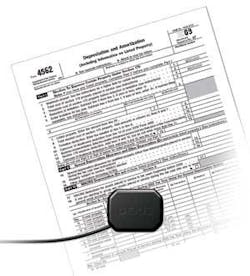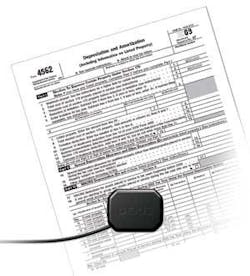X Files #9 — Give yourself a break: tax incentives on new equipment
by Terry L. Myers, DDS, FAGD
For more on this topic, go to www.dentaleconomics.com and search using the following key words: tax incentives, digital imaging, intraoral camera, technology, Dr. Terry L. Myers.
In our recovering economy, current tax breaks provide dental practitioners the opportunity to improve life for patients and the practice. My investments in technology, such as digital intraoral X–ray and 3–D imaging, have differentiated my practice from the competition. Before embarking on these practice–building purchases, it is important to discuss the budget with the hero of this month's column, your CPA, who can figure out ways to make your investments work for you, especially during tax time.
Recent government incentives, such as the 2008 Economic Stimulus Act, can recoup some of the cost of these new systems. Alan Jones, my CPA, explains that Section 179 allows the taxpayer to deduct 100% of a portion of an asset acquisition up to $250,000 for the year it was placed into service. Jones notes, “Before this incentive, a business recovered some of the cost for this tangible personal property by depreciating it over five or seven years.” However, some limitations exist. “You can't Section 179 yourself into a loss,” says Jones, meaning that your deduction cannot exceed your business' taxable income. Also, the total annual purchases cannot exceed $800,000, or the amount deducted is reduced.
Another type of deduction, called bonus depreciation, is targeted to start–up practices that are not yet experiencing a profit. Depending upon the state, fledgling businesses can deduct 50% of the purchase price of the equipment up–front, and in some cases still qualify for the standard deduction for the year as well.
“This type of deduction doesn't phase out over $800,000, so if you are buying equipment for setting up a big clinic, you can still get the bonus depreciation and recoup quite a sum up–front and write off the rest over the life of the equipment for three, five, or seven years, depending on the equipment,” says Jones.
In some cases, deductions have the potential to produce a financially beneficial “loss scenario.” Jones says, “If the deductions reduce their income enough, some could requalify for incentives that they would not be entitled to during other years.”
Through careful planning with your CPA, depending on the person's income from past employment before opening the new business, Jones says that these deductions have allowed some people to qualify for financial incentives like tuition credits for their children, or other tax credits because of their reduced income.
“If you don't take these deductions and your income is high, you could lose those other credits,” says Jones.
Tax deductions are tied to Adjusted Gross Income, which is total income from taxable sources minus certain deductions. Certain deductions such as Section 179 may only be available during a specific time period. That's why it is imperative to discuss possible deduction sources such as Section 179 with your tax preparer.
Tax benefits are also contingent upon your business' entity, such as sole proprietorship, limited liability corporations, or sub S or sub C corporations.
“While state law determines the type of entity, how the entity is taxed is under federal auspices,” says Jones, “so the process is often involved and complex.”
Alan Jones, who practices in Raymore, Mo., has been my friend since high school and my CPA since a year before I started my dental practice. His grasp of current deductions has given me the confidence to grow my practice. My DEXIS and Gendex imaging systems have improved patient care and treatment acceptance, and my CPA's knowledge has saved me significant money. These incentives will sunset within a short time; so let your CPA shed some light on your budget to keep April 15 from being so taxing this year.
Dr. Terry L. Myers is a fellow in the Academy of General Dentistry and a member of the Academy of Cosmetic Dentistry and the Dental Sleep Disorder Society. He has a private practice in Belton, Mo. You may contact Dr. Myers by e–mail at office@keystone–dentistry.com.

